MIT Research Reveals Job Task Evolution Over 40 Years

A comprehensive study by researchers at the Massachusetts Institute of Technology (MIT) has analyzed how job tasks have transformed over the past four decades. Utilizing OpenAI’s GPT-4.1 model, the researchers categorized work tasks performed in 1977 and 2018 into three main categories: abstract, routine, and manual. The findings illustrate significant shifts in the workforce, driven largely by advancements in computerization and automation.
The study highlights a notable decline in the share of routine, codifiable tasks. In contrast, the proportion of abstract, problem-solving tasks has seen a marked increase. This evolution reflects broader trends in the labor market, where technology continues to reshape the nature of work and the skills required for various roles.
Shifting Landscapes of Employment
In 1977, many workers performed tasks that were more predictable and manual in nature. These routine tasks often included assembly line work, data entry, and other activities that were easily codified, making them prime candidates for automation. Fast forward to 2018, and the landscape has shifted dramatically; an increasing number of jobs now require complex problem-solving and cognitive skills.
The study provides compelling data on this transition. For instance, the percentage of jobs involving manual tasks has decreased significantly as industries adopt technology to streamline operations. This shift has not only impacted the types of jobs available but has also altered the skills that are in high demand in the labor market.
The Role of Technology in Job Transformation
The integration of technology into everyday work tasks has been a driving force behind these changes. As automation technologies advance, they take over routine tasks, allowing workers to focus more on abstract tasks that require human intuition and creativity. This transformation presents both opportunities and challenges for the workforce.
With the rise of artificial intelligence and machine learning, the need for workers to adapt and develop new skills has never been greater. The MIT research underscores the importance of education and training programs that equip individuals with the necessary skills to thrive in a rapidly changing job market.
The implications of these findings are profound, affecting not only individual workers but also businesses and economies at large. Companies are increasingly seeking employees who can navigate complex problems and make strategic decisions, further emphasizing the shift towards a more skilled workforce.
As we look to the future, understanding the trends in job tasks will be crucial for policymakers, educators, and business leaders. The research from MIT serves as a reminder of the ongoing evolution in the workplace, driven by technology and the increasing demand for cognitive skills.






